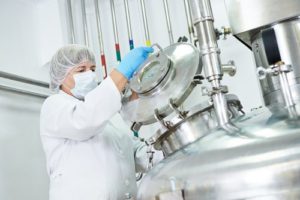GMP (GOOD MANUFACTURING PROCESS)
GMP refers to the Good Manufacturing Practice Regulations promulgated by the US Food and Drug Administration under the authority of the Federal Food, Drug, and Cosmetic Act (See Chapter IV for food, and Chapter V, Subchapters A, B, C, D, and E for drugs and devices.) These regulations, which have the force of law, require that manufacturers, processors, and packagers of drugs, medical devices, some food, and blood take proactive steps to ensure that their products are safe, pure, and effective.
GMP regulations require a quality approach to manufacturing, enabling companies to minimize or eliminate instances of contamination, mix-ups, and errors. This in turn, protects the consumer from purchasing a product which is not effective or even dangerous. GMP regulations address issues including record keeping, personnel qualifications, sanitation, cleanliness, equipment verification, process validation, and complaint handling. Most GMP requirements are very general and open-ended, allowing each manufacturer to decide individually how to best implement the necessary controls.
What does GMP cover?
- Record maintenance
- Equipment Verification
- Personnel Qualifications
- Sanitation
- Procedure Validation
- Complaint Handling
- Cleanliness
Advantages of GMP
- Poor quality products can damage health.
- GMP certification helps boost export opportunities.
- GMP certification enhances consumer confidence in your products;
- GMP certification helps to reduce operating costs due to rework and penalties due to non-compliance
- GMP Certification improves the food safety management system.
GMP CERTIFICATION IN DELHI. GMP CERTIFICATION IN MUMBAI. GMP CERTIFICATION IN NOIDA. GMP CERTIFICATION IN GURGAON. GMP CERTIFICATION IN FARIDABAD.
GMP CONSULTANTS IN DELHI NCR. GMP CONSULTANTS IN MUMBAI.



